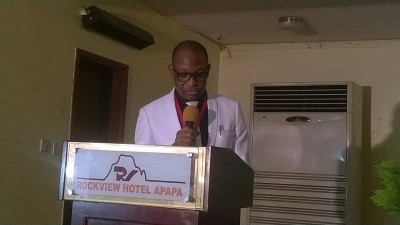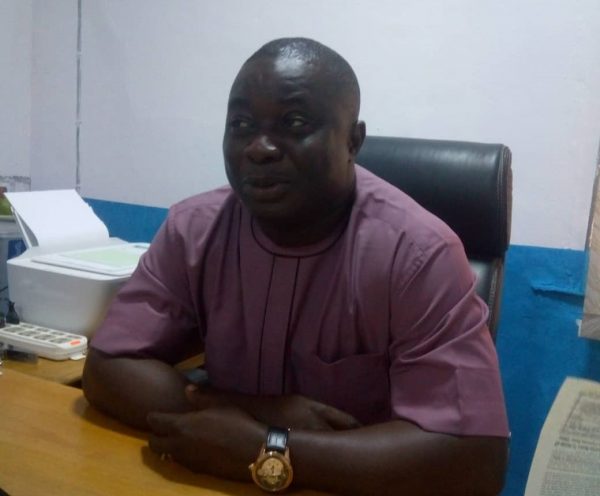Safety Precautions At The Gantry And Jetty

In this week’s edition of Shippers’ Guide, Mr. Adio Oyebo, the Safety Manager (SM) of Rahmaniyya Oil and Gas,guides you on the necessary safety tips to adhere to while loading oil or gas in the tanks or discharging from the vessels. He educates you on the agencies of government that should be on ground before your vessel can start discharging products.
What are the safety precautions taken when a vessel is discharging to the tanks?
Before a vessel discharges, the Navy will be informed, the Department of Petroleum Resources (DPR) will be in the know, the Customs and Immigration will also be aware. After their inspections, it is then that the vessel will start discharging. At the jetty, we have the inlets from where the products flow into the tanks. We have one for the AGO, PMS, and DPK. We have men who monitor this so that there won’t be any mistake in discharging products that is supposed to go to tank A to tank B. In Rahmanniya here, we have 7 tanks, 4 for PMS, 2 for AGO and 1 for DPK and each has 10 million volume capacities.
Do you have any safety men on ground in case of any accident?
Here in Rahmanniyya , we have laid down safety precautions to follow. There are always standby pumps. They are called hydrants layout or water pipes around the loading area. In any fire situation, you must know how to fight fire, as a matter of fact in every depot, the safety officers must be prepared for any eventuality. So, these officers are always on the lookout for anything could cause harm like a spark or anything like that. Then there are safety loaders whose job is to check the rate at which the vessel is pumping to avoid filling the tank to the brim. They check from time to time so that the tank will not be filled to the brim to avoid spillage. When a tank is over filled, it is a problem that must be attended to as fast as possible. So we put all these measures in place to avoid or prevent any eventual accident. We also have the maintenance department; it is part of the safety department. Their job is to make sure that all the pipes and pumps are in good shape before a vessel discharges.
You mentioned before that the Custom, DPR, Immigration and the Navy must carry out inspection before vessel discharges, what does that have to do with safety?
Immigration will come and inspect who and who are in the vessel. Some illegal immigrants come through that means too and you won’t know who will constitute danger to the country. The custom will have to verify who they are, are they coming in legally or not, then the DPR will come to check if the product is of the standard required of them and make sure that what they brought to the country will not be harmful to the country. When all the checks are satisfied then the vessel will discharge.
Did your safety officers undergo any kind of training?
Yes, safety training most of our safety personnel are trained in combating fire and other safety techniques. As far as Rahmaniyya is concerned, anything concerning safety is treated with utmost care.
Apart from fire, what other accidents may occur while discharging?
Like I told you before, if there is any failure in the valves, it can result to spillage, so put measures to forestall this from happening. We also have recovery measures if the oil eventually spills by accident, even though it is a rare occurrence, but if there is any leakage, we will first ask the captain of the vessel to stop pumping, then we will start the recovery process. We will divert the spilled oil into an oil-water separator so that it will separate the oil and the water. We make sure that oil is not leaked into the sea because of the environmental impact and the aquatic life.
Are there safety precautions in loading them?
Before any tanker comes in, we have checklist, it is the directory of tankers that come in. We also have to make sure that the product the tanker is loading is the one it loaded before. Example if a tanker’s loading is PMS, he will not be allowed to load DPK with that tanker unless it washed first. It must be washed before it will be used to carry another product other than the one it last carried, otherwise the effect of the mixture of PMS and DPK can cause explosion when you put it to use, so all these are preventable. When any tanker is being loaded it must be bonded at earth to prevent spark from any static electricity. If it is not bonded and enough petroleum is being omitted, it can cause spark which will in turn cause fire. That is why we have fire fighting equipments like the extinguisher, sand and carbon dioxide all around the premises.
The static electricity you talked about, how does it occur?
Static electricity is the electricity being generated when non- combustible material flows in between, it is the flow of two non- combustible materials, a static energy can be generated, and that’s where bonding comes in because when a static energy is generated it will be transferred into the earths.
You talked about washing the tankers if they are to be used to carry a different products, how does that happen?
We will tell the drivers to go out to do the washing before they come in. We just make sure that the tank is thoroughly washed before it comes in to load.
Does one have to enter inside tank to do the washing?
No, we don’t support that, it is not advisable at all.
Has there been any kind of accident here?
We have never had any serious accident here. The ones we had are minor ones that did not pose any danger. They are just minor leakages here in the gantry where the tankers load. If you look carefully, there is a drainage system that takes any leaked oil directly to the separator so that it does not waste, go into the sea or cause any environmental hazard.











